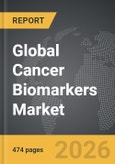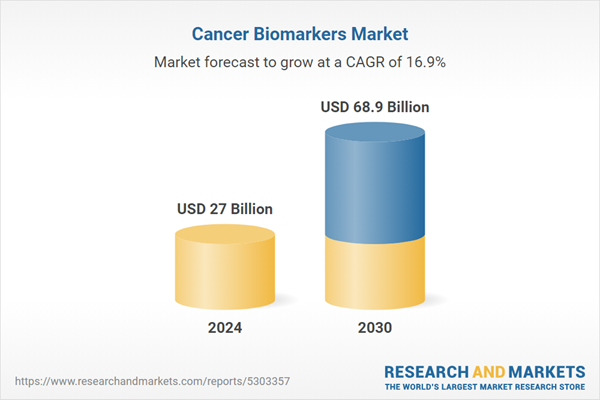Global Cancer Biomarkers Market - Key Trends & Drivers Summarized
Why Are Cancer Biomarkers Gaining Importance in Modern Oncology?
Cancer biomarkers have become a cornerstone in modern oncology, transforming the way cancer is diagnosed, monitored, and treated. Biomarkers, which are molecules found in blood, tissue, or other body fluids, provide critical information about cancer's presence, progression, and response to treatment. They allow for earlier and more accurate detection of cancer, often before symptoms manifest, giving patients a better chance at successful treatment. The role of biomarkers extends beyond diagnostics; they are integral to personalized medicine, helping oncologists tailor treatment plans based on an individual's unique cancer profile. By identifying specific genetic mutations, proteins, or other molecular changes, cancer biomarkers can guide the selection of targeted therapies that improve outcomes and minimize side effects.The increasing reliance on cancer biomarkers is fueled by the global push toward precision medicine. Biomarkers are used in identifying cancer subtypes and assessing the likelihood of metastasis or recurrence. Their use is rapidly expanding, from well-known cancers like breast, lung, and colorectal cancer, to more complex and rare types. As research continues to uncover new biomarkers, the oncology community is gaining powerful tools to improve patient prognosis, reduce unnecessary treatments, and make informed clinical decisions. As a result, the demand for biomarker-based tests and therapies is accelerating, shaping the future of cancer care.
How Are Technological Advancements Driving the Cancer Biomarkers Market?
Technological advancements in genomics, proteomics, and bioinformatics are revolutionizing the cancer biomarker landscape. High-throughput technologies like next-generation sequencing (NGS) and mass spectrometry are enabling the identification of novel biomarkers with unprecedented precision and speed. These innovations allow researchers to analyze vast amounts of genetic and proteomic data, uncovering complex molecular signatures associated with different cancer types. This capability is crucial in understanding the heterogeneity of cancer and in developing more effective targeted therapies. Liquid biopsies, which detect cancer biomarkers from a simple blood sample, are another major technological advancement that is transforming early detection and monitoring of cancer.Artificial intelligence (AI) and machine learning are also becoming integral to biomarker discovery and analysis. AI algorithms can process and interpret large datasets from genomic studies, identifying patterns that may be difficult for humans to detect. These technologies are speeding up the identification of actionable biomarkers and aiding in the development of predictive models for cancer outcomes. Additionally, advancements in bioinformatics tools are enabling better integration and analysis of multi-omics data, leading to more comprehensive insights into the molecular mechanisms of cancer. These technological developments are making cancer biomarker testing more accessible, cost-effective, and reliable, further driving market growth.
How Is Consumer Awareness and Demand for Personalized Medicine Shaping the Market?
The growing consumer awareness of personalized medicine is a significant factor propelling the cancer biomarkers market. Patients are increasingly informed about the benefits of targeted therapies and personalized treatment approaches, which rely heavily on biomarkers to identify the most effective treatments for their specific cancer types. As more individuals seek tailored cancer care, healthcare providers are increasingly incorporating biomarker testing into their diagnostic and treatment protocols. This shift towards personalized medicine is not only improving patient outcomes but also enhancing the efficiency of cancer treatment by reducing trial-and-error approaches and minimizing exposure to ineffective therapies.Pharmaceutical companies are also capitalizing on this trend by developing targeted cancer therapies that are designed to interact with specific biomarkers. The rise of immunotherapies and other targeted treatments, such as checkpoint inhibitors and monoclonal antibodies, is closely tied to the identification and utilization of biomarkers. As patients demand treatments that offer better efficacy and fewer side effects, the integration of biomarkers in drug development is becoming essential. Additionally, the increasing use of direct-to-consumer genetic testing is raising awareness of cancer risk factors, prompting more patients to seek out biomarker-driven diagnostic tests and personalized treatment options.
Growth in the Cancer Biomarkers Market Is Driven by Several Factors
The growth in the cancer biomarkers market is driven by several factors, including advancements in technology, the increasing adoption of personalized medicine, and the rising incidence of cancer globally. Technological innovations, such as next-generation sequencing and liquid biopsy, are enabling the rapid discovery and validation of new biomarkers, making cancer detection and monitoring more precise and less invasive. The demand for non-invasive tests like liquid biopsies is particularly high, as they offer a less painful and more convenient alternative to traditional tissue biopsies, while still providing critical information about tumor dynamics and treatment response.Another key driver is the rising demand for personalized cancer treatments. As healthcare providers and patients alike seek more effective and tailored treatment options, biomarker-driven therapies are becoming a central part of cancer care. The increasing development of targeted therapies, such as immunotherapies, which rely on specific biomarkers to identify eligible patients, is fueling the demand for biomarker testing. Furthermore, the expanding use of biomarkers in clinical trials is helping pharmaceutical companies accelerate the development of novel cancer therapies, contributing to market growth. Additionally, government initiatives aimed at promoting cancer research, biomarker discovery, and early detection programs are further boosting the adoption of biomarker-based diagnostics and treatments, ensuring sustained growth in the cancer biomarkers market.
Report Scope
The report analyzes the Cancer Biomarkers market, presented in terms of market value (US$ Thousand). The analysis covers the key segments and geographic regions outlined below.- Segments: Biomarker Type (Protein Biomarkers, Genetic Biomarkers, Other Cancer Biomarkers); Profiling Technology (Omics Technologies, Imaging Technologies, Immunoassay, Other Profiling Technologies); Cancer Type (Breast Cancer, Lung Cancer, Colorectal Cancer, Prostate Cancer, Other Cancer Types); Application (Diagnostics, Research & Development, Prognostics, Other Applications).
- Geographic Regions/Countries:World; United States; Canada; Japan; China; Europe (France; Germany; Italy; United Kingdom; Spain; Russia; and Rest of Europe); Asia-Pacific (Australia; India; South Korea; and Rest of Asia-Pacific); Latin America (Argentina; Brazil; Mexico; and Rest of Latin America); Middle East (Iran; Israel; Saudi Arabia; United Arab Emirates; and Rest of Middle East); and Africa.
Key Insights:
- Market Growth: Understand the significant growth trajectory of the Protein Biomarkers segment, which is expected to reach US$42.9 Billion by 2030 with a CAGR of a 17.4%. The Genetic Biomarkers segment is also set to grow at 16.4% CAGR over the analysis period.
- Regional Analysis: Gain insights into the U.S. market, valued at $6.8 Billion in 2024, and China, forecasted to grow at an impressive 21.8% CAGR to reach $18.3 Billion by 2030. Discover growth trends in other key regions, including Japan, Canada, Germany, and the Asia-Pacific.
Why You Should Buy This Report:
- Detailed Market Analysis: Access a thorough analysis of the Global Cancer Biomarkers Market, covering all major geographic regions and market segments.
- Competitive Insights: Get an overview of the competitive landscape, including the market presence of major players across different geographies.
- Future Trends and Drivers: Understand the key trends and drivers shaping the future of the Global Cancer Biomarkers Market.
- Actionable Insights: Benefit from actionable insights that can help you identify new revenue opportunities and make strategic business decisions.
Key Questions Answered:
- How is the Global Cancer Biomarkers Market expected to evolve by 2030?
- What are the main drivers and restraints affecting the market?
- Which market segments will grow the most over the forecast period?
- How will market shares for different regions and segments change by 2030?
- Who are the leading players in the market, and what are their prospects?
Report Features:
- Comprehensive Market Data: Independent analysis of annual sales and market forecasts in US$ Million from 2024 to 2030.
- In-Depth Regional Analysis: Detailed insights into key markets, including the U.S., China, Japan, Canada, Europe, Asia-Pacific, Latin America, Middle East, and Africa.
- Company Profiles: Coverage of players such as Abbott Laboratories, Agilent Technologiesent, Becton, Dickinson and Company, Biomérieux Sant, Bio-Rad Laboratories and more.
- Complimentary Updates: Receive free report updates for one year to keep you informed of the latest market developments.
Some of the 33 companies featured in this Cancer Biomarkers market report include:
- Abbott Laboratories
- Agilent Technologiesent
- Becton, Dickinson and Company
- Biomérieux Sant
- Bio-Rad Laboratories
- Danaher Corporation
- GE Healthcare
- Hologic
- Illuminat
- Merck & Co.
- Myriad Genetics
- Qiagen N.V.
- Quest Diagnostics
- Roche Diagnostics
- Sysmex Corporation
- Thermo Fisher Scientific
This edition integrates the latest global trade and economic shifts into comprehensive market analysis. Key updates include:
- Tariff and Trade Impact: Insights into global tariff negotiations across 180+ countries, with analysis of supply chain turbulence, sourcing disruptions, and geographic realignment. Special focus on 2025 as a pivotal year for trade tensions, including updated perspectives on the Trump-era tariffs.
- Adjusted Forecasts and Analytics: Revised global and regional market forecasts through 2030, incorporating tariff effects, economic uncertainty, and structural changes in globalization. Includes historical analysis from 2015 to 2023.
- Strategic Market Dynamics: Evaluation of revised market prospects, regional outlooks, and key economic indicators such as population and urbanization trends.
- Innovation & Technology Trends: Latest developments in product and process innovation, emerging technologies, and key industry drivers shaping the competitive landscape.
- Competitive Intelligence: Updated global market share estimates for 2025, competitive positioning of major players (Strong/Active/Niche/Trivial), and refined focus on leading global brands and core players.
- Expert Insight & Commentary: Strategic analysis from economists, trade experts, and domain specialists to contextualize market shifts and identify emerging opportunities.
Table of Contents
Companies Mentioned (Partial List)
A selection of companies mentioned in this report includes, but is not limited to:
- Abbott Laboratories
- Agilent Technologiesent
- Becton, Dickinson and Company
- Biomérieux Sant
- Bio-Rad Laboratories
- Danaher Corporation
- GE Healthcare
- Hologic
- Illuminat
- Merck & Co.
- Myriad Genetics
- Qiagen N.V.
- Quest Diagnostics
- Roche Diagnostics
- Sysmex Corporation
- Thermo Fisher Scientific
Table Information
| Report Attribute | Details |
|---|---|
| No. of Pages | 474 |
| Published | February 2026 |
| Forecast Period | 2024 - 2030 |
| Estimated Market Value ( USD | $ 27 Billion |
| Forecasted Market Value ( USD | $ 68.9 Billion |
| Compound Annual Growth Rate | 16.9% |
| Regions Covered | Global |









